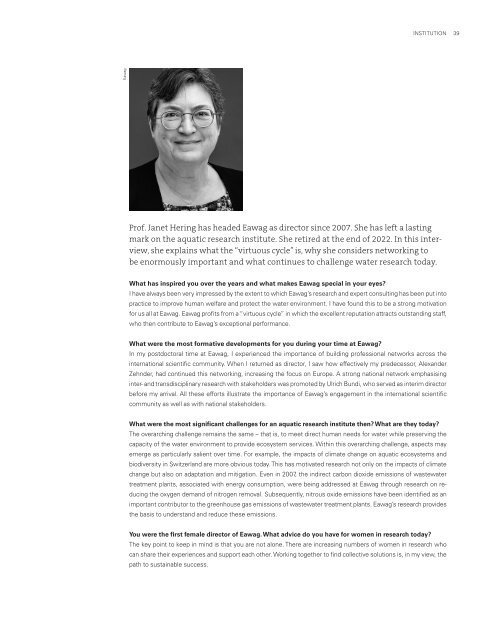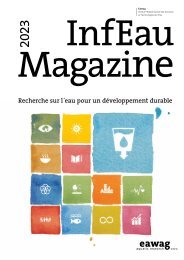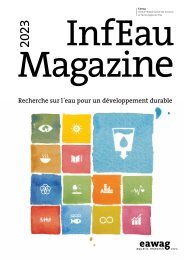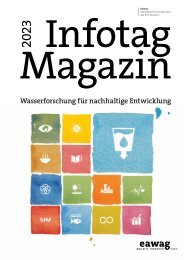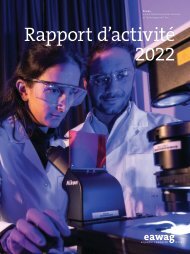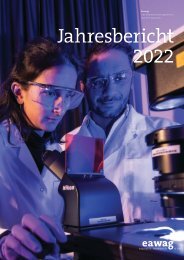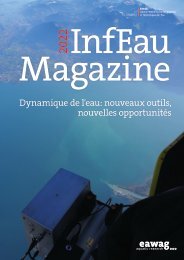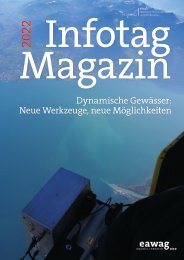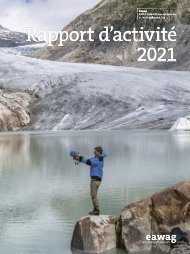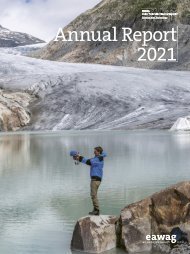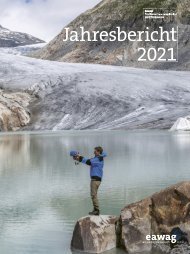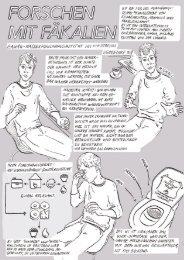Eawag Annual Report 2022
As the aquatic research institute of the ETH Domain, our research is in service of society. You can see this for yourself in our Annual Report. The annual compact review highlights the most relevant research results of the past year and shows how they were developed.
As the aquatic research institute of the ETH Domain, our research is in service of society. You can see this for yourself in our Annual Report. The annual compact review highlights the most relevant research results of the past year and shows how they were developed.
Create successful ePaper yourself
Turn your PDF publications into a flip-book with our unique Google optimized e-Paper software.
INSTITUTION<br />
39<br />
<strong>Eawag</strong><br />
Prof. Janet Hering has headed <strong>Eawag</strong> as director since 2007. She has left a lasting<br />
mark on the aquatic research institute. She retired at the end of <strong>2022</strong>. In this interview,<br />
she explains what the “virtuous cycle” is, why she considers networking to<br />
be enormously important and what continues to challenge water research today.<br />
What has inspired you over the years and what makes <strong>Eawag</strong> special in your eyes?<br />
I have always been very impressed by the extent to which <strong>Eawag</strong>’s research and expert consulting has been put into<br />
practice to improve human welfare and protect the water environment. I have found this to be a strong motivation<br />
for us all at <strong>Eawag</strong>. <strong>Eawag</strong> profits from a “virtuous cycle” in which the excellent reputation attracts outstanding staff,<br />
who then contribute to <strong>Eawag</strong>’s exceptional performance.<br />
What were the most formative developments for you during your time at <strong>Eawag</strong>?<br />
In my postdoctoral time at <strong>Eawag</strong>, I experienced the importance of building professional networks across the<br />
international scientific community. When I returned as director, I saw how effectively my predecessor, Alexander<br />
Zehnder, had continued this networking, increasing the focus on Europe. A strong national network emphasising<br />
inter- and transdisciplinary research with stakeholders was promoted by Ulrich Bundi, who served as interim director<br />
before my arrival. All these efforts illustrate the importance of <strong>Eawag</strong>’s engagement in the international scientific<br />
community as well as with national stakeholders.<br />
What were the most significant challenges for an aquatic research institute then? What are they today?<br />
The overarching challenge remains the same – that is, to meet direct human needs for water while preserving the<br />
capacity of the water environment to provide ecosystem services. Within this overarching challenge, aspects may<br />
emerge as particularly salient over time. For example, the impacts of climate change on aquatic ecosystems and<br />
biodiversity in Switzerland are more obvious today. This has motivated research not only on the impacts of climate<br />
change but also on adaptation and mitigation. Even in 2007, the indirect carbon dioxide emissions of wastewater<br />
treatment plants, associated with energy consumption, were being addressed at <strong>Eawag</strong> through research on reducing<br />
the oxygen demand of nitrogen removal. Subsequently, nitrous oxide emissions have been identified as an<br />
important contributor to the greenhouse gas emissions of wastewater treatment plants. <strong>Eawag</strong>’s research provides<br />
the basis to understand and reduce these emissions.<br />
You were the first female director of <strong>Eawag</strong>. What advice do you have for women in research today?<br />
The key point to keep in mind is that you are not alone. There are increasing numbers of women in research who<br />
can share their experiences and support each other. Working together to find collective solutions is, in my view, the<br />
path to sustainable success.


